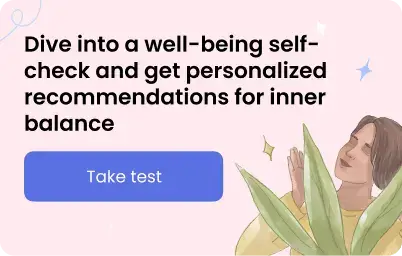Oh, what a day! You go down the street from the office, ready to fall on the couch and start crying once you get home. Everything went wrong.
You didn’t meet a deadline, and your boss wasn’t pleased. You spilled coffee on your favorite shirt during lunch, and to top it off, you argued with a work bestie.
As you finally make it home and collapse onto the couch, you expect the tears to flow, but they just don’t. Instead, you feel numb and wonder, “Why can’t I cry? I am so unhappy; why can’t I release my feelings?”
You might be surprised, but many people find crying difficult or almost impossible, even in the toughest situations.
Why is it so? Let’s find the answer to the question, “Why am I sad but can’t cry?” together and learn what to do with it in this article.
Why can’t I cry anymore? 6 reasons
Now, as you understand how important it is to free up your tears, it’s time to explain why sometimes you can’t do it. So that next time, after a hard day at work, you won’t need to handle the question, “Why can’t I cry anymore even when I want to?”
Avoiding emotions
“Why can’t I cry when I want to cry?” It could be that you’re trying to avoid confronting your feelings.
Sometimes, avoiding emotions in a moment can help you handle complicated situations. But if it’s a temporary strategy, blocking your feelings can bring a lot of drawbacks.
“I can’t work, feel sad, and find it difficult to cry. Am I lazy or depressed?” In fact, it might be none of the mentioned. These concerns may highlight that repressed emotions might negatively influence your mental health.
Childhood trauma
People often avoid emotions for various reasons. Adverse childhood experiences can play a significant role, especially if you grew up with emotionally distant or narcissistic parents.
The cold mother syndrome is an example where a child’s emotional needs weren’t met. Such a kid may feel like a scapegoat child in the family. Because of this, many people can’t express emotions freely. Fear of judgment, rejection, or appearing weak can also cause some of us to avoid their feelings.
“For instance, if a child was told they could not cry because “it is not nice and strong kids don’t cry,” it is highly plausible that as an adult, this same kid wouldn’t know how to express sadness or tears; they may even express it in a different way, such as anger, because they were taught early on that crying was not okay,“ she adds.
If you’re wondering, “Why can’t I cry anymore, and my mental health feels worse?”, it’s essential to address this situation.
Social pressure
“Boys don’t cry.” “Girls shouldn’t cry over everything.”
Have you ever heard these statements? Forget about them.
When you dwell on questions like, “Why do I feel empty?” or “Why can’t I cry in front of others?”, think about cultural standards that make you feel ashamed. Even though there’s nothing to feel ashamed about.
There are plenty of gender and social stereotypes that make us believe that crying — as well as showing other negative emotions — is something wrong.
If parents in your family tend to express sadness and frustration in other ways, it’s OK that you use similar coping strategies. Nevertheless, if they considered crying something “forbidden,” it could leave a lasting scar on your emotional intelligence and the way you show your emotions.
Mental health conditions
A flat affect is when someone doesn’t display emotions as intensively as others. It is a common symptom of some mental health conditions, like:
- schizophrenia
- autism
- depression
- brain damage
- post-traumatic stress disorder (PTSD)
- bipolar disorder
However, it’s necessary to note people can experience the symptoms of mental health conditions differently. While some living with depression may cry a lot, others might feel muted emotions. Any manifestation is possible.
We also asked Enna Sanghvi, from Teachers College, Columbia University, if she observed differences in crying patterns among clients with certain medical conditions or neurological disorders.
“I have a background in psychiatry. Based on my experience, I have noticed common triggers for individuals dealing with similar concerns. For instance, when patients describe previous sexual trauma, they often tear up. However, it is not standard across all patients.”
“There are also patients, she adds, who could describe their most traumatic experience without crying at all. I think there is a lot more nuance in psychiatry when it comes to understanding the differences and similarities between crying patterns.“
Medical conditions
The key to the question, “Why do I want to cry but can’t?” may also relate to physical issues. There are a few medical conditions that make it difficult to fall into tears.
- Dry eye syndrome (keratoconjunctivitis sicca). Despite the complicated official name, this phenomenon simply means that the tissues around the eye are dry. Because of this, the body hardly produces tears, making it difficult to cry even when you feel the need.
- Sjögren’s syndrome. This autoimmune disorder occurs when the immune system harms the glands responsible for producing and regulating moisture in the body. As a result, a person may have dry eyes and mouth and difficulty crying.
- Allergies. They can contribute to dry eyes, making it hard for the body to produce tears. Pollen, dust, pet dander, and other allergies can cause eye dryness. This reaction not only makes it difficult to cry but can also lead to discomfort and irritation.
If you seek an answer to, “Why can’t I cry even though I want to?” it may be reasonable to contact a licensed healthcare provider who can identify any underlying problems and provide appropriate treatment.

Medications side effects
Not only medical conditions but medications can also prevent us from crying. While some can cause a flat affect, changing the way we experience emotions, others may influence the development of dry eye syndrome.
Some people can’t physically cry because of the following:
- Antidepressants
- Antihistamines
- Hormonal therapies
- Blood pressure medications
- Anticancer drugs
- Oral contraceptives
- Antipsychotics
- Beta-blockers
Note this list of the most common medications that might make you almost unable to cry. Still, there are a lot of others that can have similar side effects. So, discussing how certain medications might affect you with your healthcare provider is vital.
What else can lead to the fact that you can’t cry when you’re sad? Alcohol, cannabis, and even some herbal supplements might have similar influences.
“I want to cry, but I can’t.” What could this hint towards?
“Crying relieves pressure on the soul.” ― Toba Beta, writer and poet.
So, you’re still here, on the couch, feeling confused that no tears are left. What will you do next? You’ll probably Google something like, “I can’t cry. Is it OK?”
We have some answers.
It is normal and typical for many people. In many cases, there’s nothing concerning or worrisome about the inability to cry. Sometimes, our bodies just react differently to stress or emotional overload.
Nonetheless, it can be the first hint of something more serious. Moreover, this process has some significant benefits you might miss out on.
- Stress relief. What is the first thing people want to do when they argue with a loved one or face overwhelming work pressure? Often, it’s to find a quiet place to cry. Impressively, we feel much better after releasing pent-up emotions.
- Emotional expression. Research shows that revealing emotions through crying can lead to better well-being. It helps us prevent the buildup of negative feelings and process feelings like sadness, frustration, and grief.
- Mood booster. “Why can’t I cry when I want to?” If you deal with this question, you might have noticed how much better you feel after a good cry. Sounds weird, right? In fact, the same research states that crying stimulates the production of endorphins, the body’s natural feel-good chemicals, which can enhance mood.
- Fostering emotional bonds. Sometimes, crying shows other people, “I need support and a helping hand.” While those who offer it to you often feel more connected, creating a deeper sense of understanding in your relationships.
FAQ. Why can’t I cry?
Is it a problem if I haven’t cried in a long time?
In a nutshell, no. Crying isn’t something everyone should do at least once a week or a year.
If you feel well and use other ways to release your emotions, this situation is completely normal. However, if you feel overwhelmed and frustrated because of the inability to cry, it may be helpful to explore it further and seek support.
Why can’t I cry after a breakup?
Difficult experiences can sometimes lead you to emotional numbness, which can temporarily hinder the ability to cry. Emotionally numbing can help you avoid the pain and upset of the breakup.
I can’t cry. How can I encourage myself to do it if I need to release emotions?
The tips are rather simple yet effective. Here are the most common strategies that might be helpful to release your feelings.
- Find a private place
- Analyze the emotions you might repressed
- Try free writing or journaling
- Watch a sad movie or listen to music
- Look at old photos or memories
- Talk to a person you trust
If you understand that the root cause is much deeper, it might be necessary to consult a therapist or a mental health provider. A professional can help you discover the reasons and ways to process your emotions healthily.
Disclaimer
This article is for general informative and self-discovery purposes only. It should not replace expert guidance from professionals.
Any action you take in response to the information in this article, whether directly or indirectly, is solely your responsibility and is done at your own risk. Breeze content team and its mental health experts disclaim any liability, loss, or risk, personal, professional, or otherwise, which may result from the use and/or application of any content.
Always consult your doctor or other certified health practitioner with any medical questions or concerns
Breeze articles exclusively cite trusted sources, such as academic research institutions and medical associations, including research and studies from PubMed, ResearchGate, or similar databases. Examine our subject-matter editors and editorial process to see how we verify facts and maintain the accuracy, reliability, and trustworthiness of our material.
Was this article helpful?





